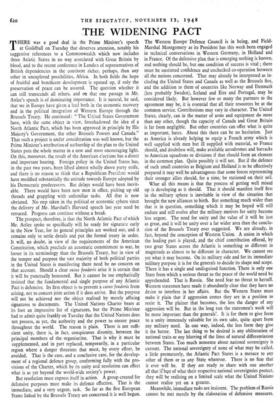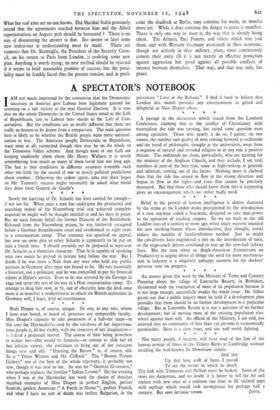THE WIDENING PACT
THERE was a good deal in the Prime Minister's speech at Guildhall on Tuesday that deserves attention, notably his suggestive references to a Commonwealth which now includes three Asiatic States in no way associated with Great Britain by blood, and to the recent conference in London of representatives of British dependencies in the continent richer, perhaps, than any other in unexplored possibilities, Africa. In both fields the hope of fruitful and beneficent development is opened up, if only the preservation of peace can be assured.. The question whether it can still transcends all others, and on that one passage in Mr. Attlee's speech is of dominating importance. It is natural, he said, that we in Europe have given a lead both in the economic recovery and in the political integration of Western Europe through the Brussels Treaty. He continued : " The United States Government have, with the same object in view, foreshadowed the idea of a North Atlantic Pact, which has been approved in principle by His Majesty's Government, the other Brussels Powers and Canada." That such a project is under consideration was well known, but the Prime Minister's attribution of authorship of the plan to the United States puts the whole matter in a new and most encouraging light. On this, moreover, the result of the American eections has a direct and important bearing. Foreign policy in the United States has, in the past two years, been lifted almost wholly above party strife, and there is no reason to think that a Republican Presidtmt would have modified substantially the attitude towards Europe adopted by his Democratic predecessors. But delays would have been inevit- able. There would have been new men in office, picking up old threads and grappling with unfamiliar tasks. All that is now obviated. No step taken in the political or economic sphere since the delivery of Mr. Marshall's Harvard speech last year need be retraced. Progress can continue without a break.
The prospect, therefore, is that the North Atlantic Pact of which Mr. Attlee spoke so specifically will be ready for signature early in the New Year, for its general principles are worked out, and it remains only to settle details and put the formal treaty in order. It will, no doubt, in view of the requirements of the American Constitution, which preclude an automatic commitment to war, be looser in its terminology than the Brussels Treaty, but in view of the temper and purpose the vast majority of both political parties in the United States is manifesting there need be no concern on that account. Should a clear casus foederis arise it is certain that it will be punctually honoured. But it cannot be too emphatically insisted that the fundamental and single purpose of any Atlantic Pact is defensive. Its first object is to prevent a casus foederis from arising, not to concert joint action if it does arrive. But the purpose will not be achieved nor the object realised by merely affixing signatures to documents. The United Nations Charter bears at its foot an impressive list of signatures, but the Prime Minister had to admit quite frankly on Tuesday that the United Nations does not possess, as yet, the authority and the power to ensure peace throughout the world. The reason is plain. There is not suffi- cient unity, there is, in fact, conspicuous disunity, between the principal members of the organisation. That is why it must be supplemented, and in part replaced, temporarily, in a particular region where a danger threatens that must, by every effort, be avoided. That is the case, and a conclusive case, for the develop- ment of a regional defence group, conforming fully with the pro- visions of the Charter, which by its unity and resolution can effect what is as yet beyond the world-wide society's power.
But resolution must express itself in action. A group created for defensive purposes must make its defence effective. That is the immediate, and a very urgent, task. So far as the five European States linked by the Brussels Treaty are concerned it is well begun. The Western Europe Defence Council is in being, and Field- Marshal Montgomery as its President has this week been engaged in technical conversations in Western Germany, in Holland and in France. Of the defensive plan that is emerging nothing is known, and nothing should be, but one condition of success is vital ; there must be unstinted confidence and unchecked co-operation between all the nations concerned. That may already be interpreted as in- cluding the United States and Canada as well as the Brussels five, and the addition to thein of countries like Norway and Denmark (less probably Sweden), Iceland and Eire and Portugal, may be considered likely. But however few or many the partners to the agreement may be, it is essential that all their resources be at the common service. Contributions may vary in character. The United States, clearly, can in the matter of arms and equipment do more than any other, though the capacity of Canada and Great Britain is far from negligible. But other countries can offer what is quite as important, bases. About this there can be no hesitation. Just as America is already, helping to equip a French army which is well supplied with men but ill supplied with material, so France should, and doubtless will, make available aerodromes and barracks to American squadrons or divisions if that should form an element in the common plan. Quite possibly it will not. But if the defence of such small countries as Belgium and Holland is to be effectively prepared it may well be advantageous that some forces representing their stronger allies should, for a time, be stationed on their soil.
What all this means is that the process of getting well mixed up is developing as it should. That it should manifest itself first in the military sphere is inevitable in view of the situation that brought the new alliances to birth. But something much wider than that is in question, something which it may be hoped will still endure and still evolve after the military motives for unity become less urgent. The need for unity and the value of it will be just as great, and it will be unity over a far wider area than the conclu- sion of the Brussels Treaty ever suggested. We are already, in fact, beyond the conception of Western Union. A union in which the leading part is played, and the chief contribution offered, by two great States across the Atlantic is something so different in magnitude as almost to be different in character. We cannot see yet what it may become. On its military side and for its immediate military purpose it is for the generals to decide its shape and scope. There it has a single and undisguised function. There is only one State from which a serious threat to the peace of the world need be apprehended. That is Russia. She need fear no threat to herself. Western statesmen have made it abundantly clear that they have no desire to interfere in her affairs. But the Western States must make it plain that if aggression comes they are in a position to resist it. The plainer that becomes, the less the danger of any aggression will be. But in the long run the statesmen's work will be more important than the generals'. It is for them to give form to a unity immensely valuable for its own sake, quite apart from any military need. In one way, indeed, the less form they give it the better. The last thing to be desired is any obliteration of national traits or any blurring of the lines of natural differentiation between States. Too much nonsense about national sovereignty is current. The national sovereignty of none of what may be called, a little prematurely, the Atlantic Pact States is a menace to any other of them or to any State whatever. There is no fear that it ever will be. If they are ready to share with one another all that is best of what their respective national sovereignties protect, they will be realising on a limited scale what the United Nations cannot realise yet on a greater.
Meanwhile, immediate tasks are insistent. The problem of Russia cannot be met merely by the elaboration of defensive measures. What her real aims are no one knows. Did Marshal Stalin genuinely intend that the agreements reached between him and the Allied representatives on August 3oth should be honoured ? There is no way of discovering the answer to that. But sooner or later some new endeavour at understanding must be made. There are rumours that Dr. Bramuglia, the President of the Security Coun- cil, on his return to Paris from London, is evolving some new plan. Anything is worth trying; no new method should be rejected if it seems to hold reasonable promise of success; but the possi- bility must be frankly faced that the present tension, and in parti- cular the deadlock at Berlin, may continue for weeks or months more yet. While it does. continue the danger to peace is manifest. There is only one way to meet it, the way that is already being taken. The Atlantic Pact Powers, and others which may join them, and with Western Germany associated in their economic, though not actively in their military, plans, must continuously cement their unity till it is not merely an effective protection against aggression but proof against all possible conflicts of interest between themselves. That way, and that way only, lies peace.



































 Previous page
Previous page